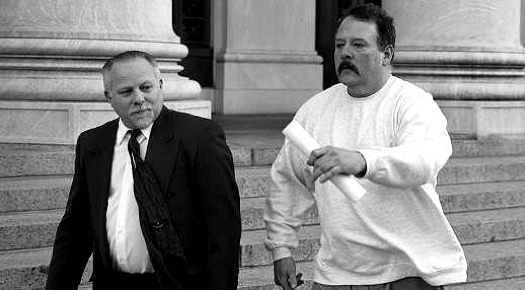
A man in Meriden, Connecticut, who was accused of shooting into a mosque, was recently released on a $400,000 bail but put under house arrest at his mother’s home in Shelton. Ted Hakey Jr was granted his bail after his mother Mary agreed to be his custodian, meaning she would have to report any violation of the terms and conditions of his release to federal authorities.
United States Magistrate Judge Sarah Merriam told Hakey that she was very disturbed by the allegations that had been leveled against him by the Federal Bureau of Investigation, which reported that he tried to mislead state probation officials. Apparently, Hakey kept an eye on the mosque and also posted anti-Muslim sentiments on his Facebook page. However, Merriam also took notice of Hakey’s lack of recent criminal record and the possibility that even if he was to be convicted for the charges that have been leveled against him, damaging religious property with a dangerous weapon, his sentence would range from no prison to approximately one year.
Even though the government has a strong case against Hakey, Merriam said it was quite possible that his pretrial detention would exceed his actual sentence. She stated that by prohibiting Hakey from owning ammunition and firearms and by demanding that he does not consume alcohol, she could reasonably assure the community’s safety. Reportedly, the government has already seized all of his guns.
Under the terms and conditions of his release that Merriam set on January 4, Hakey must be supervised to make sure that he does not consume alcohol or drugs, does not leave his mother’s home apart from medical appointments and court dates, wears a GPS monitor around his ankle, has no contact with victims or potential witnesses, surrenders his passport to federal authorities and undergoes necessary psychological evaluation.
Federal prosecutors had opposed Hakey’s release, saying he is too much of a risk to the community. Yet, Hakey’s attorney John Walkley filed certain conditions for his release, many of which were adopted by Merriam on Monday.
Hakey had been held without bail since December 18. Three days later, a federal grand jury in New Haven refused an indictment, charging him with one count of damaging religious property with a dangerous weapon. Walkley said that Hakey was willing to talk to people at the mosque to ensure them that he meant no danger but Merriam ordered Hakey not to contact anyone at the mosque.
Monday’s hearing was a continuation of Hakey’s detention hearing that was started on December 21. On that day, Assistant United States Attorney Raymond Miller read out several posts from Hakey’s Facebook page in an attempt to illustrate his hatred towards Muslims.
Earlier, on November 14, a day after the terrorist attacks in Paris killed 130 people, Hakey had reportedly posted on Facebook, “What is gonna be the breaking point to go 'weapons free' against Islam.”
Roughly six hours later, he fired four shots into Baitul Aman Mosque on 410 Main Street, which happens to be next door to his home. Police officials confirmed that the mosque was empty at the time of the attack and nobody was injured.
According to court records, Hakey had had a couple of drinks at a bar and at home, before stepping outside and discharging 10 rounds from a 9mm handgun. He told police officials that he had not intended to attack the mosque and did not believe that he had done so until investigators turned up at his doorstep the next morning. He also swore that he felt no animosity towards Muslims or Islam.
During a search at Hakey’s resident on November 16 however, investigators seized over 1,000 rounds of ammunition, as many as 24 guns, one bulletproof vest and many electronic devices. Federal agents said that they had recovered certain items associated with Hells Angels motorcycle club, which they claim is an outlaw motorcycle gang under the United States Department of Justice. Reportedly, agents also found a chair in Hakey’s attic that was positioned in a manner overlooking the neighbouring mosque.
Photo Credits: Hartford Courant
